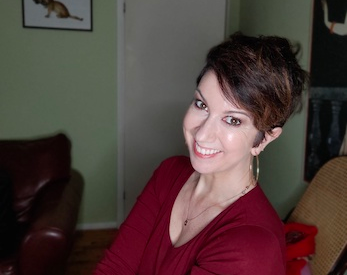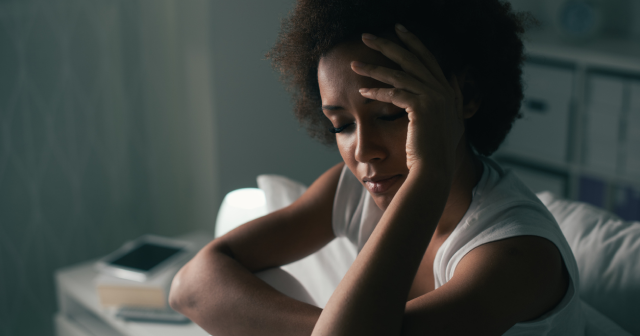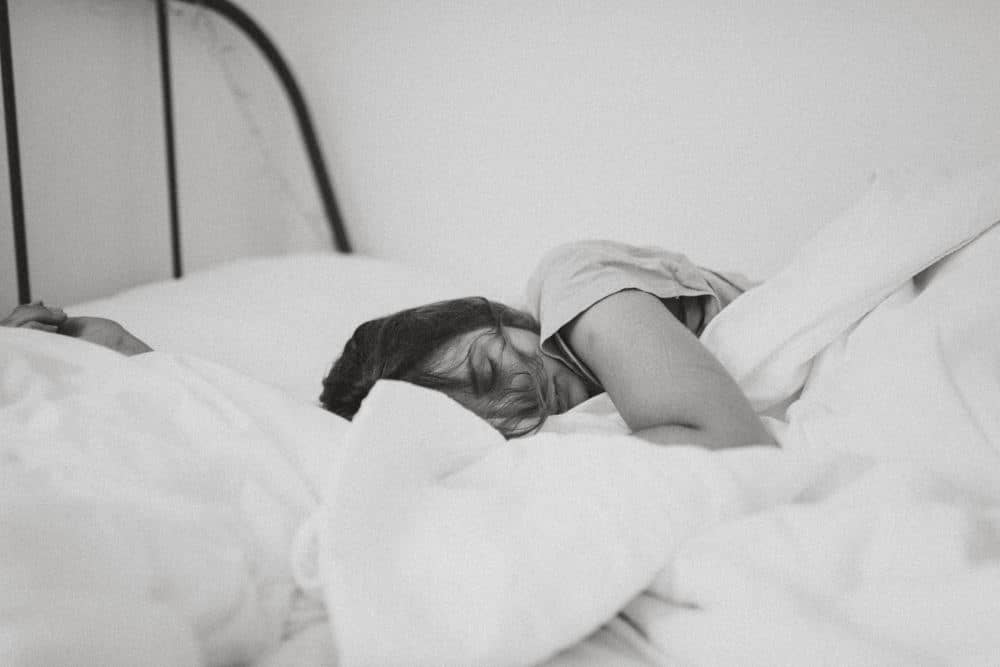Did you know that something called pink noise could help you drop off at night? Or that warm feet can actually help lower your body temperature to get bed-ready? Once you’ve got your sleep basics sorted (read more about those in our complete guide to better sleep), we explore the lesser-known, science-backed hacks that could help you get the best quality sleep.
1. Music is good (it doesn’t have to be whales)
What the science says: Several studies have suggested listening to music before bed can help you unwind and sleep more deeply. Listening to music is a pleasurable activity that can trigger the release of feelgood dopamine and reduce stress hormone cortisol. It may also affect your nervous system, lowering your heart rate and slowing your breathing. Plus, it can help drown out any unwelcome noises from foxes/traffic/your neighbours.
What you can do: Find music that works for you. It’s often recommended you pick tunes with a tempo of between 60 and 80bpm, but some research suggests the real key is listening to music you enjoy and have found soothing in the past.
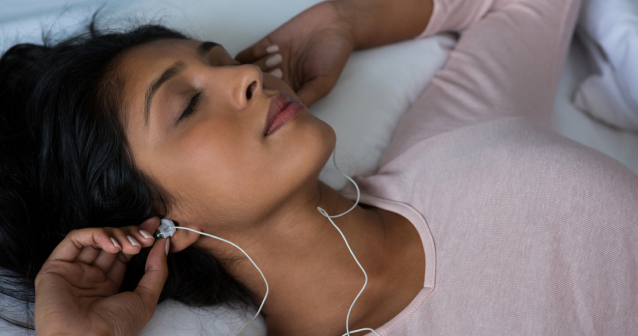
2. Try white (and pink) noise
What the science says: So-called white noise, a steady humming sound like a whirring fan, can mask disruptive background sounds and may help some people nod off. More recently, some limited research has suggested pink noise, which includes deeper rhythmic sounds such as rainfall and rustling leaves, can help slow brainwaves and encourage sleep.
What you can do: Try pink and white noise playlists – on music and sleep apps, and online – to see if they help. Keep the volume low and set a timer if you don’t want to leave it on all night.
3. Warm up your feet
What the science says: Your core body temperature drops in readiness for sleep and for that to happen, blood flow needs to move towards your hands and feet. Did you know you can speed up that process? Having a warm bath or shower moves circulation away from your core body to your extremities and research shows having a warm bath or shower, at around 40-43C, before bed, helps you fall asleep 10 minutes faster.
What you can do: Aim for a warm bath or shower in the one to two hours before you go to bed, and try to soak for around 10 minutes. You can ramp up the soothing effects by adding a relaxing bath oil, like lavender. No time for a bath? You can still trigger the release of heat from your body by soaking your feet in a bowl of warm water while you're watching TV in the evening, or stick on a pair of warm socks before bed. One study found that people who wore socks or used other foot warming methods fell asleep quicker and stayed snoozing for longer.
Read more about other natural aids for better sleep.
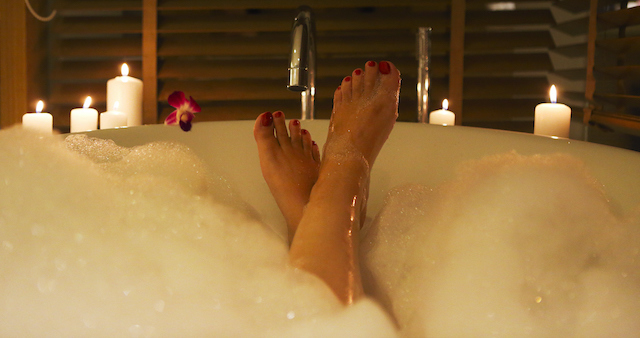
4. Brain dump your to-do list
What the science says: Ever find yourself lying in bed fretting about what you need to do the next day? These worries can be a major sleep disruptor – some research has found sleep problems are more common at the start of the working week, probably for this reason. One study found writing down your to-do list before you sleep may be helpful for a sound snooze, helping to get thoughts out of your mind so you can relax.
What you can do: Spend 5 minutes before bed writing out anything you need to do the following day, being as specific as possible about the tasks you need to tick off.
5. Let your digestive system clock off before bed
What the science says: When your day is busy, dinnertime can get pushed back close to bedtime – but a study found that people who ate or drank in the hour before bed were more likely to have disrupted sleep. According to the scientists, there could be a number of reasons for this, including digestive issues and an increased risk of needing to get up for a nighttime pee. Although people who ate close to bed reported sleeping for longer, that may be because the sleep they did have was less efficient.
What you can do: Try to leave some space between your evening meal and bedtime to allow your food to digest by avoiding any food and drink in the hour before you go to sleep. Find out more about foods that may help you nod off.
6. Choose the right exercise for better sleep
What the science says: Exercise can help improve sleep quality. In fact, some research shows it may be as effective for insomnia as sleeping pills, without the side effects or risk of dependence. There are a few theories about how it might help. Working out can ease depression and anxiety, both known to interfere with sleep. Exercise can also raise your core body temperature, allowing it to fall around 30 to 90 minutes afterwards – it’s thought this may mimic the drop in body temperature that can help trigger sleep.
What you can do: Doing 30 minutes of moderate-intensity aerobic activity, like brisk walking, has been shown to be most effective. But consistency is key, so do whatever you’ll stick with. If you find that exercising too close to bedtime makes you more alert, try to wrap up your workout at least 2 hours before you hit your duvet. See what works for you.
7. Stretch before bed
What the science says: Soothing pre-bed activities can help you relax for sleep. This may be especially important if you feel anxious about sleep, as stress hormones are likely to keep you awake. So before you go to bed, it may be helpful to try activities shown to reduce stress, such as yoga and meditation.
What you can do: Rather than simply falling into bed and expecting to nod off, take time to unwind. You could try gentle yoga stretches, or simply sitting quietly and focusing on your breathing can be enough to help you relax. There are also lots of apps that take you through meditations designed to help you nod off. Here are 5 exercises you can try for instant calm.
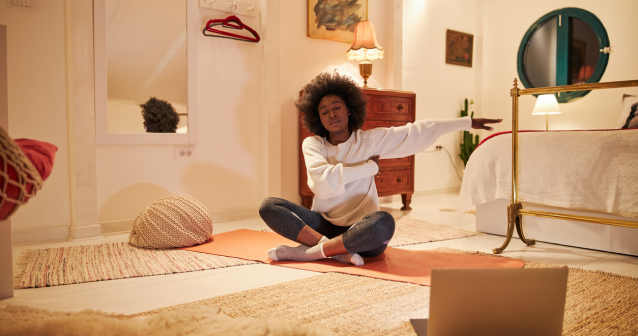
8. Turn down all the lights (not just on your phone)
What the science says: You probably know that blue light – from devices like smartphones and laptops – can interfere with your sleep. They reduce your levels of sleep hormone melatonin which is triggered by darkness, and interfere with deep and REM sleep. But did you know that LED and fluorescent lighting also gives out blue light? In fact, some studies show any bright lighting can reduce your melatonin - and bright bedroom lighting can cut evening production of melatonin by as much as 90 minutes, compared with dimmer lighting.
What you can do: Keep all lights in your house low in the run-up to bedtime, not just in your bedroom but your kitchen and living room, too. When you do get to your bedroom, leave screens (yes, your phone included) out of the room, and keep your bedroom lighting dim.
9. Have a routine – your body clock will thank you
What the science says: Going to bed and getting up at roughly the same time each day can help you sleep better. Your body’s circadian rhythm – the internal clock that regulates when you feel tired and when you feel alert – loves routine. Research shows that irregular sleep schedules can disrupt it, affecting your sleep and your overall well being.
What you can do: Look at what time you need to get up in the morning and work back to figure out when you need to go to bed for optimal sleep, so you know the routine you should try to stick to. Don’t worry if you can’t manage this every night – it’s a guide to what you should aim for most of the time.
10. Get a shot of morning light
What the science says: Some research has found when you’re exposed to bright light early in the morning, you’re more likely to fall asleep faster that night, sleep more solidly and also experience lower levels of stress and depression. That’s thought to be because getting light in the morning helps to reset your body clock, which governs your sleep-wake cycle. Morning light allows your body clock to know it’s a new day and start the countdown so you can fall asleep faster at night.
What you can do: Head outside as soon as you can after getting up. You could eat breakfast outdoors if you can, or at least by a window. Or walk part of the way to work. The researchers also found getting some light in the middle of the day could be helpful, so try to get out at lunchtime too.
Want more science backed sleep tips? Download the Healthily app today and try our 28 day Sleep Better plan, for daily tips that will help you sleep like a baby. You can also use the sleep trackers and journal to plot your changes and note what works for you.


